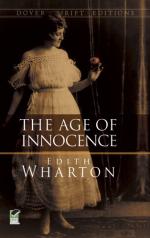“I think that’s for her to decide.”
“H’m—have you considered the consequences if she decides for divorce?”
“You mean the threat in her husband’s letter? What weight would that carry? It’s no more than the vague charge of an angry blackguard.”
“Yes; but it might make some unpleasant talk if he really defends the suit.”
“Unpleasant—!” said Archer explosively.
Mr. Letterblair looked at him from under enquiring eyebrows, and the young man, aware of the uselessness of trying to explain what was in his mind, bowed acquiescently while his senior continued: “Divorce is always unpleasant.”
“You agree with me?” Mr. Letterblair resumed, after a waiting silence.
“Naturally,” said Archer.
“Well, then, I may count on you; the Mingotts may count on you; to use your influence against the idea?”
Archer hesitated. “I can’t pledge myself till I’ve seen the Countess Olenska,” he said at length.
“Mr. Archer, I don’t understand you. Do you want to marry into a family with a scandalous divorce-suit hanging over it?”
“I don’t think that has anything to do with the case.”
Mr. Letterblair put down his glass of port and fixed on his young partner a cautious and apprehensive gaze.
Archer understood that he ran the risk of having his mandate withdrawn, and for some obscure reason he disliked the prospect. Now that the job had been thrust on him he did not propose to relinquish it; and, to guard against the possibility, he saw that he must reassure the unimaginative old man who was the legal conscience of the Mingotts.
“You may be sure, sir, that I shan’t commit myself till I’ve reported to you; what I meant was that I’d rather not give an opinion till I’ve heard what Madame Olenska has to say.”
Mr. Letterblair nodded approvingly at an excess of caution worthy of the best New York tradition, and the young man, glancing at his watch, pleaded an engagement and took leave.
XII.
Old-fashioned New York dined at seven, and the habit of after-dinner calls, though derided in Archer’s set, still generally prevailed. As the young man strolled up Fifth Avenue from Waverley Place, the long thoroughfare was deserted but for a group of carriages standing before the Reggie Chiverses’ (where there was a dinner for the Duke), and the occasional figure of an elderly gentleman in heavy overcoat and muffler ascending a brownstone doorstep and disappearing into a gas-lit hall. Thus, as Archer crossed Washington Square, he remarked that old Mr. du Lac was calling on his cousins the Dagonets, and turning down the corner of West Tenth Street he saw Mr. Skipworth, of his own firm, obviously bound on a visit to the Miss Lannings. A little farther up Fifth Avenue, Beaufort appeared on his doorstep, darkly projected against a blaze of light, descended to his private




